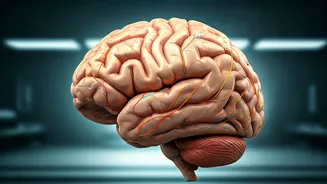The Brain's Influence
The brain significantly impacts weight loss and food cravings. The article references insights from an Apollo Delhi bariatric surgeon, explaining that
the brain often 'bullies' us into making choices that hinder weight loss. Our brains are wired in complex ways, with specific regions impacting our appetite, metabolism, and decision-making regarding food. Understanding this connection is key to managing weight effectively. The surgeon's perspective emphasizes that losing weight isn't simply a matter of willpower; it’s a neurological challenge. The brain often prioritizes immediate gratification, leading individuals towards calorie-dense foods and contributing to a persistent cycle of cravings. Thus, controlling the mind's influence is a critical step in the journey towards achieving and sustaining a healthy weight.
Decoding Cravings
Food cravings are frequently cited as the primary obstacle to weight loss. The surgeon explains that these urges originate in the brain. Specific neurotransmitters and hormones, such as dopamine and serotonin, are released during food consumption, especially when eating palatable foods high in sugar or fat. This creates a rewarding feeling, and the brain links this satisfaction with specific foods. Over time, these associations become ingrained, leading to cravings when the brain anticipates these sensations. Cravings, in effect, become a type of conditioned response, making it exceptionally challenging to resist the temptation to eat certain foods. Recognizing the neurological underpinnings of these cravings is crucial to developing strategies to counter their effects. This awareness empowers individuals to make informed decisions that align with their health goals.
Strategic Approaches
Addressing the 'brain bullying' involves adopting strategies to change the way the brain perceives food and weight management. The surgeon would likely recommend a multifaceted approach. This may include behavioral therapies aimed at modifying eating habits and breaking the cycle of cravings. Cognitive techniques, like mindfulness, may help manage emotional eating, which often exacerbates cravings. Moreover, nutritional strategies, such as focusing on a balanced diet rich in whole foods, can support the body and brain. Regular physical activity has been shown to positively influence brain chemistry, potentially reducing cravings and improving mood. Developing a solid support system, which could include support groups or professional counseling, would also be vital in ensuring long-term success. These comprehensive strategies collectively create a pathway toward healthier choices and a better relationship with food.
Long-Term Wellness
Achieving and maintaining a healthy weight is a holistic process that requires long-term commitment. It isn't just about quick fixes or temporary dietary changes. Sustained weight management involves cultivating a balanced lifestyle that addresses both physical and psychological factors. The surgeon's viewpoint highlights that this includes being patient with oneself and understanding that there will be setbacks. Focusing on overall well-being and practicing self-compassion are important components. Building sustainable habits such as regular exercise, balanced nutrition, and appropriate sleep is key. The importance of seeking support and guidance from healthcare professionals, nutritionists, or therapists cannot be understated. By integrating these strategies, individuals can create a foundation for lasting change, fostering a healthier relationship with food and a more positive body image.















